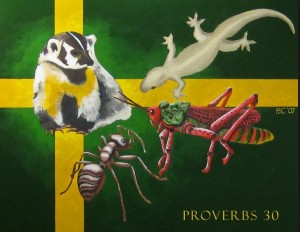When we think of the author of the Wisdom literature of the Bible, especially Proverbs, Ecclesiastes and the Song of Solomon, we often say “Solomon said…” We attribute this wisdom to Solomon because he is attributed to have  authored much of those works. However, we will find occasion when someone else wrote a particular passage. Proverbs Chapter 30 is one of those passages. It’s attributed to Agur. However, as the Lexham Bible Dictionary says, “Whether ‘Agur’ is intended as a proper name is not certain—…Agur may mean “gatherer”—and may therefore be meant as an epithet for Solomon, who ‘gathered’ wisdom.”
authored much of those works. However, we will find occasion when someone else wrote a particular passage. Proverbs Chapter 30 is one of those passages. It’s attributed to Agur. However, as the Lexham Bible Dictionary says, “Whether ‘Agur’ is intended as a proper name is not certain—…Agur may mean “gatherer”—and may therefore be meant as an epithet for Solomon, who ‘gathered’ wisdom.”
I’ve always enjoyed the imagery in the Bible. The book of Proverbs is filled with it. Agur, or Solomon, presents us with pictures that illustrate the truths he intends to teach us. In chapter 30, there are numerous references to images that elicit more than knowledge, but understanding and emotion as well. When he talks about things that are never satisfied he shows us the leech. It never stops draining its victims. He then mentions hell, a barren womb, a barren desert and a fire. When he talks about things that amaze him he sees an eagle in the sky, a serpent on a rock, a ship on the seas, and a man wooing a maiden. Then Agur directs our attention to four members of the animal kingdom. He begins by pointing out how insignificant these small things are. Yet, they can teach us some of the more “significant” lessons in life. One writer commented, “Bigness is not necessarily the same as greatness.”
In Proverbs 30:24-28, we are introduced to “Four things on earth that are small, but they are exceedingly wise…” The Hebrew expression is literally “wise trained in wisdom.” The idea of wisdom is repeated in the phrase. The NIV translates this as “extremely wise.” Today’s English Version says “very, very clever.” The Greek Septuagint renders this as “wiser than wise.” Another one says “wise beyond the wisest.” The New Jerusalem Bible says “the wisest of the wise.” These four small animals, the ant, the rock badger, the locust and the lizard, teach us things that are extremely important in life. Observing these four “small” things, can make us “wiser than the wise.” Paul wrote to the Corinthians and told them that “God has chosen what is weak in the world to shame the strong. God has chosen what is insignificant …to bring to nothing what is viewed as something…” (1 Corinthians 1:27-28).